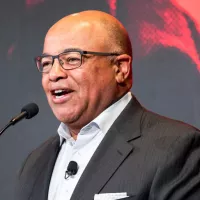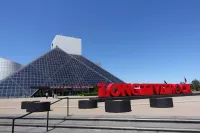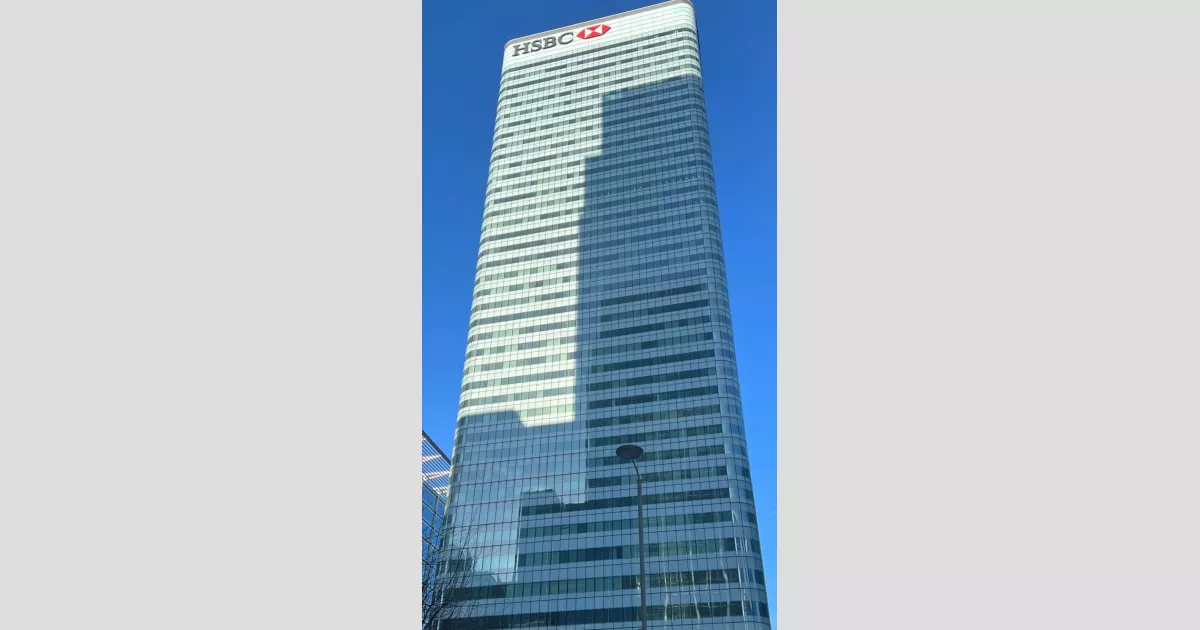HSBC Holdings plc is a British multinational universal bank and financial services group headquartered in London. It is the largest Europe-based bank by total assets under management (AUM), with US$3.098 trillion as of September 2024. HSBC ranks as the 7th largest bank globally by AUM, and the 3rd largest non-state owned bank. The company has historical and business links to East Asia and operates with a multinational footprint.
1921: New building in Bangkok
In 1921, HSBC constructed a new building in Bangkok.
1922: New building in Manila
In 1922, HSBC constructed a new building in Manila.
1923: New building in Shanghai
In 1923, HSBC constructed a new building in Shanghai.
1935: New head office building in Hong Kong
In 1935, HSBC built a new head office building in Hong Kong.
1941: Shanghai Stock Exchange Closed
In 1941, shares of HSBC were traded on the Shanghai Stock Exchange until the Japanese closed the exchange.
1953: Michael Turner became chief manager
In 1953, Michael Turner became chief manager of HSBC and started diversifying the business.
1955: The Hong Kong and Shanghai Banking Corporation of California Established
In 1955, The Hong Kong and Shanghai Banking Corporation of California was established.
1962: Jake Saunders Succeeded Michael Turner
In 1962, Jake Saunders succeeded Michael Turner as chief manager.
1964: Executive Chairmanship Superseded Chief Managership
In 1964, the Chief Managership was superseded by an Executive Chairmanship as the top executive role in the bank.
1983: Hongkong and Shanghai Banking Corporation adopts hexagon symbol as logo
In 1983, the Hongkong and Shanghai Banking Corporation adopted the hexagon symbol as its logo.
1986: New Building in Hong Kong
In 1986, HSBC's new building in Hong Kong, designed by Sir Norman Foster, was one of the most expensive and technologically advanced buildings in the world.
October 1989: Registered as a regulated bank
In October 1989, HSBC was registered as a regulated bank with the Banking Commissioner of the Government of Hong Kong.
March 1991: Transformation into parent holding company
On March 25, 1991, HSBC Holdings plc completed its transformation into the parent holding company to the Hongkong and Shanghai Banking Corporation Limited.
1991: HSBC Holdings plc Established
In 1991, HSBC Holdings plc, the present parent legal entity, was established in London. The historic Hong Kong-based bank became its fully-owned subsidiary.
1991: Group Chairman Position Formed
In 1991, the position of Group Chairman was formed. The preceding position, Chairman of The Hongkong and Shanghai Banking Corporation, has remained a separate position.
1991: Group Chief Executive Position Formed
In 1991, the position of Group Chief Executive was formed. The preceding position, chief executive of The Hongkong and Shanghai Banking Corporation, has remained a separate position.
1992: Acquisition of Midland Bank completed
In 1992, HSBC Holdings' acquisition of Midland Bank was completed, giving HSBC a substantial market presence in the United Kingdom.
1992: Takeover of Midland Bank
In 1992, HSBC took over Midland Bank, becoming one of the largest domestic banks in the United Kingdom.
1993: Relocation of world headquarters
In 1993, HSBC Holdings plc was required to relocate its world headquarters from Hong Kong to London.
1993: HSBC Moves Headquarters to London
In 1993, HSBC moved its headquarters to London. However, Hong Kong remains its largest market.
March 1997: Purchase of Banco Bamerindus
In March 1997, HSBC purchased Banco Bamerindus of Brazil for $1 billion.
May 1997: Acquisition of Roberts SA de Inversiones
In May 1997, HSBC acquired Roberts SA de Inversiones of Argentina for $600 million.
November 1998: HSBC Adopts Unified Brand
In November 1998, HSBC announced the adoption of the HSBC brand and hexagon symbol as the unified brand in all markets.
May 1999: Purchase of Republic National Bank of New York
In May 1999, HSBC expanded its presence in the United States with the purchase of Republic National Bank of New York for $10.3 billion.
1999: HSBC Becomes Venue Sponsor for Buffalo Sabres
From 1999, HSBC's American division was the venue sponsor for the Buffalo Sabres of the National Hockey League (NHL), known as the HSBC Arena.
April 2000: Acquisition of Crédit Commercial de France
In April 2000, HSBC acquired Crédit Commercial de France for £6.6 billion.
2000: Peter Braunwalder was head of HSBC Swiss
Peter Braunwalder was the former head of HSBC Swiss from 2000 to 2008.
July 2001: Bought Demirbank
In July 2001, HSBC bought Demirbank, an insolvent Turkish bank.
July 2002: Purchase of portion of Arthur Andersen's tax practice
In July 2002, HSBC USA, Inc. announced that it would purchase a portion of Arthur Andersen's tax practice through a new subsidiary, Wealth and Tax Advisory Services USA Inc. (WTAS).
August 2002: Acquisition of Grupo Financiero Bital
In August 2002, HSBC acquired Grupo Financiero Bital, SA de CV, Mexico's third largest retail bank for $1.1 billion.
November 2002: Acquisition of Household Finance Corporation
In November 2002, HSBC acquired Household Finance Corporation (HFC), a US credit card issuer and subprime lender, for £9 billion (US$15.5 billion).
April 2003: Opening of new headquarters in London
In April 2003, the new headquarters of HSBC Holdings at 8 Canada Square, London, officially opened.
July 2003: Acquisition of Asset Management Technology (AM TeK)
In July 2003, HSBC announced that it had agreed to acquire 82.19% of the Korean fund administrator, Asset Management Technology (AM TeK), for $12.47 million in cash.
2003: HFC Renamed HSBC Finance
In 2003, HSBC Finance, formerly Household Finance Corporation, was the second largest subprime lender in the United States.
2003: U.S. regulators ordered HSBC to strengthen anti-money laundering practices
In 2003, U.S. regulators ordered HSBC to strengthen its anti-money laundering practices.
December 2004: Acquisition of Marks & Spencer Retail Financial Services Holdings Ltd
In December 2004, HSBC acquired Marks & Spencer Retail Financial Services Holdings Ltd for £763 million in the United Kingdom.
March 2005: COO Alan Jebson's statement on global service centers
In March 2005, HSBC COO Alan Jebson projected the expansion of global service centers, anticipating at least 25,000 employees and 15 centers within three years. He noted a setup cost of $20-30 million per center and savings of $20,000 per job moved.
November 2005: Launch of HSBC Direct in the USA
In November 2005, HSBC Direct, a telephone/online direct banking operation, was first launched in the USA. This service offers mortgages, accounts, and savings, and it's based on HSBC's 'First Direct' subsidiary in Britain.
2005: Accusations of money laundering
In 2005, Bloomberg Markets magazine accused HSBC of money laundering for drug dealers and state sponsors of terrorism.
2005: Mis-selling of Residential mortgage-backed securities started
In 2005, HSBC mis-sold Residential mortgage-backed securities, which led to the 2018 settlement.
April 2006: Bought branches of Banca Nazionale del Lavoro
In April 2006, HSBC bought the 90 branches in Argentina of Banca Nazionale del Lavoro for $155 million.
July 2006: Acquisition of Westpac's sub-custody operations
In July 2006, HSBC acquired Westpac's sub-custody operations in Australia and New Zealand for $112.5 million.
November 2006: HSBC Partners with SOS Children as part of Future First
In November 2006, HSBC announced a $5 million partnership with SOS Children as part of Future First.
2006: HBUS failure to conduct AML of bulk cash transactions
From mid-2006 to mid-2009, HBUS failed to conduct any AML of $15 billion in bulk cash transactions from HSBC affiliates.
October 2007: Increased capital
In October 2007, HSBC transferred £750 million to London and lent £4 billion to other UK banks.
2007: Mis-selling of Residential mortgage-backed securities continued
In 2007, HSBC continued mis-selling Residential mortgage-backed securities, which led to the 2018 settlement.
2007: Wrote down holdings of subprime-related mortgage securities
In 2007, HSBC wrote down its holdings of subprime-related mortgage securities by $10.5 billion.
2007: Hacked HSBC account records from whistle-blower Hervé Falciani
The Swiss Leaks information released in February 2015 was based on the 2007 hacked HSBC account records from whistle-blower Hervé Falciani.
May 2008: Acquisition of IL&FS Investment
In May 2008, HSBC acquired IL&FS Investment, an Indian retail broking firm.
August 3, 2008: Began banking operations in Algeria
On August 3, 2008, HSBC began its banking operations in Algeria with the opening of a branch in Algiers.
2008: HSBC Loses Customer Data Disc
In 2008, HSBC announced the loss of a disc containing details of 370,000 customers of its life insurance business. The bank was later fined over £3 million by the Financial Services Authority for data protection failures.
2008: HSBC Failure to report suspicious transactions
In 2008, HSBC failed to report suspicious transactions in Argentina, leading to a fine in 2012.
2008: Profit of US$9.3 billion
In 2008, HSBC made US$9.3 billion of profit.
2008: CEO of HSBC Mexico was informed about money laundering
In 2008, the CEO of HSBC Mexico was reportedly informed by Mexican law enforcement about a recording of a Mexican drug lord, who indicated that HSBC Mexico was a preferred location for money laundering.
2008: Peter Braunwalder was head of HSBC Swiss
Peter Braunwalder was the former head of HSBC Swiss from 2000 to 2008.
March 2009: Announced Rights Issue
In March 2009, HSBC announced a £12.5 billion (US$17.7 billion; HK$138 billion) rights issue. On 9 March 2009 HSBC's share price fell 24.14%.
March 2009: Shutdown of HSBC Finance branch network
In March 2009, HSBC announced that it would shut down the branch network of its HSBC Finance arm in the United States.
September 2009: Poland launching business direct
In September 2009, Poland is launching business direct.
2009: HBUS failure to conduct AML of bulk cash transactions
From mid-2006 to mid-2009, HBUS failed to conduct any AML of $15 billion in bulk cash transactions from HSBC affiliates.
2009: HSBC ceased banking operations in Nicaragua
In 2009, HSBC ceased its banking operations in Nicaragua.
2009: HSBC Sponsors British & Irish Lions Tour to South Africa
In 2009, HSBC sponsored the British & Irish Lions during their tour to South Africa.
September 2010: Geoghegan to step down
On 23 September 2010, Geoghegan announced he would step down as chief executive of HSBC and was succeeded by Stuart Gulliver.
October 2010: HSBC Becomes Title Sponsor of World Sevens Series
In October 2010, the International Rugby Board announced a 5-year deal with HSBC, granting them status as the first-ever title sponsor of the World Sevens Series.
October 2010: United States OCC issued a Cease and Desist Order
In October 2010, the United States OCC issued a Cease and Desist Order requiring HSBC to strengthen multiple aspects of its Anti-Money Laundering (AML) program, citing various failures including a large backlog of suspicious activity alerts.
2010: HSBC Named 'Official Banking Partner' of The Open Championship
In 2010, HSBC was named the 'Official Banking Partner' of the Open Championship in a five-year deal.
2010: Departure of Stephen Green
In 2010, then-chairman Stephen Green planned to depart HSBC to accept a government appointment in the Trade Ministry.
2010: FinCEN Files showed HSBC continued to serve alleged criminals
The FinCEN Files revealed that HSBC continued serving alleged criminals and corporations involved in government corruption. Between 2010 and 2016, HSBC processed $292 million for the Waked Family company Viva Panama before the United States Department of the Treasury declared it a drug money-laundering organization.
April 2011: Closure of retail banking business in Russia
On 25 April 2011, HSBC decided to shut down its retail banking business in Russia and reduce its private banking presence to a representative office.
August 2011: HSBC agreed to sell 195 branches to First Niagara Financial Group Inc
In August 2011, HSBC agreed to sell 195 branches in New York and Connecticut to First Niagara Financial Group Inc, divested to KeyCorp, Community Bank, N.A. and Five Star Bank for around $1 billion, and closed 13 branches in Connecticut and New Jersey. Also, Capital One Financial Corp. agreed to acquire HSBC's U.S. credit card business for $2.6 billion.
August 2011: Job Cuts Announced
In August 2011, HSBC announced that it will cut 25,000 jobs and exit from 20 countries by 2013.
2011: HSBC Arena Renamed FirstNiagara Center
In 2011, HSBC Arena was renamed to FirstNiagara Center after HSBC's divesture of its upstate New York bank branches to Buffalo-based First Niagara Bank.
2011: Renaming of Personal Financial Services
In 2011, HSBC announced renaming of its Personal Financial Services (PFS) business group to Retail Banking and Wealth Management (RBWM).
2011: Rename of Personal Financial Services to Retail Banking and Wealth Management
In 2011, HSBC announced the renaming of Personal Financial Services (PFS) to Retail Banking and Wealth Management (RBWM) during its Investor Day.
2011: HSBC ceased banking operations in Georgia
In 2011, HSBC ceased its banking operations in Georgia.
2011: HSBC's profit in 2011
In 2011, HSBC made a profit of 16.8 billion.
July 2012: US Senate committee report on HSBC money-laundering breaches
In July 2012, a US Senate committee issued a report stating that HSBC had breached money-laundering rules and assisted Iran and North Korea in circumventing US nuclear-weapons sanctions.
July 2012: India investigated alleged violation of safety compliance
On 19 July 2012, India investigated alleged violation of safety compliance, in which Indian employees were believed to be involved.
November 2012: HSBC offshore accounts in Jersey investigation
In November 2012, it was reported that HSBC had established offshore accounts in Jersey for suspected drug-dealers and other criminals, leading to an investigation by HM Revenue and Customs into £700 million allegedly held in HSBC accounts in the Crown dependency.
November 2012: Arvind Kejriwal alleges HSBC accounts hiding black money
On 9 November 2012, Indian activist and politician Arvind Kejriwal alleged that 700 Indian bank accounts were hiding black money, totaling ₹60 billion (US$690 million), with HSBC in Geneva.
December 2012: CNNMoney article compared the fine to HSBC's profit
A December 2012 CNNMoney article compared the 1.9 billion dollar fine to HSBC's profit "last year" (2011) of 16.8 billion.
December 2012: U.S. government might resist criminal prosecution of HSBC
In December 2012, Assistant U.S. Attorney General Lanny Breuer indicated that the U.S. government might avoid criminally prosecuting HSBC to prevent the potential loss of the bank's U.S. charter and avoid systemic economic repercussions and job losses.
December 2012: HSBC penalised $1.9 billion for violating U.S. laws
In December 2012, HSBC was penalized $1.9 billion (US), which was the largest fine under the Bank Secrecy Act, for violating four U.S. laws designed to protect the U.S. financial system. The bank allegedly laundered at least $881 million in drug proceeds and processed an additional $660 million for banks in US-sanctioned countries.
December 2012: HSBC agreed to pay a record $1.92 billion fine in money laundering case
On 11 December 2012, HSBC agreed to pay a record $1.92 billion fine in a money laundering case due to overlooking internal warnings about inadequate monitoring systems. The United States Department of Justice decided not to pursue criminal penalties.
2012: HSBC ceased banking operations in Slovakia
In 2012, HSBC ceased its banking operations in Slovakia.
2012: HSBC sold businesses in several countries
In 2012, HSBC sold its businesses in Costa Rica, El Salvador, Honduras, Colombia, Peru, Uruguay, Paraguay and Hungary.
2012: HSBC fined by Argentina for failure to report suspicious transactions
In 2012, HSBC was fined $14 million by Argentina for failure to report suspicious transactions in the country back in 2008.
2012: U.S. Senate hearings for anti-money laundering practices
In 2012, HSBC was the subject of U.S. Senate hearings for severe deficiencies in its anti-money laundering practices. The committee's findings, presented on 16 July 2012, highlighted the transfer of $7 billion in banknotes from HSBC's Mexican to its US subsidiary, disregard for terrorist financing links, and circumvention of US safeguards, including hiding $19.4 billion in transactions with Iran.
2012: US Senate investigators sought the hacked HSBC account records from Falciani
In 2012, US Senate investigators sought the hacked HSBC account records from Falciani and French authorities, but never received the data.
January 2013: Search warrants and raids beginning
Search warrants and raids against HSBC began in January 2013.
February 2013: CEO Stuart Gulliver acknowledged bank structure was "not fit for purpose"
In early February 2013, HSBC CEO Stuart Gulliver acknowledged before the UK's Parliamentary Banking Standards Commission that the bank's structure had been "not fit for purpose." He also admitted that matters needing escalation weren't properly shared, and HSBC faced accusations of laundering money for terrorist groups.
March 2013: Argentina accuses HSBC of facilitating money laundering and tax evasion
In mid-March 2013, following search warrants and raids beginning in January 2013, Argentina's main taxing authority accused HSBC of using fake receipts and dummy accounts to facilitate money laundering and tax evasion.
May 2013: Refocus of business strategy
On 11 May 2013, HSBC's chief executive Stuart Gulliver announced that HSBC would refocus its business strategy with large-scale retrenchment of operations planned to save US$3.5 billion by 2013.
June 2013: Undercover expose of HSBC officers agreeing to launder "black money"
In June 2013, a media outlet in India conducted an undercover expose where HSBC officers were caught on camera agreeing to launder "black money." Consequently, HSBC placed these employees on leave pending an internal investigation.
July 2013: Alan Keir appointed chief executive of HSBC Bank plc
In July 2013, Alan Keir was appointed chief executive of HSBC Bank plc, succeeding Brian Robertson. Keir's responsibilities included overseeing the firm's UK, European, Middle Eastern, and African divisions.
2013: Job Cuts Continued
By 2013 HSBC would cut 25,000 jobs.
2013: HSBC ceased retail banking operations in South Korea
In 2013, HSBC ceased its retail banking operations in South Korea.
2013: HSBC Sponsors British & Irish Lions Tour to Australia
In 2013, HSBC sponsored the British & Irish Lions during their tour to Australia.
June 2014: HSBC Life (UK) Limited agreed to sell its £4.2 billion UK pensions business to Swiss Re
In June 2014, HSBC Life (UK) Limited agreed to sell its £4.2 billion UK pensions business to Swiss Re.
November 2014: Belgian Prosecutors Accuse HSBC of Tax Fraud and Money Laundering
In November 2014, Belgian Prosecutors accused HSBC of tax fraud and money laundering for allegedly helping hundreds of clients move money into offshore tax havens.
December 2014: Stuart Scott's Tenure as European Head Ends
In December 2014, Stuart Scott ceased to be HSBC's European head of foreign exchange trading in London and was later accused of the same crimes as Mark Johnson.
2014: HSBC sold businesses in Kazakhstan, Pakistan, Jordan, Libya, Cook Islands and Cayman Islands
In 2014, HSBC sold its businesses in Kazakhstan, Pakistan, Jordan, Libya, Cook Islands and Cayman Islands.
2014: HSBC fined for Forex scandal
In 2014, HSBC was fined US$275m by the US CFTC for taking part in the Forex scandal.
February 2015: Swiss Leaks information released by ICIJ
In February 2015, the International Consortium of Investigative Journalists (ICIJ) released information about HSBC's business conduct under the title Swiss Leaks, alleging the bank profited from business with tax evaders.
February 2015: International Consortium of Investigative Journalists released information about the business conduct of HSBC under the title Swiss Leaks
In February 2015, the International Consortium of Investigative Journalists released information about HSBC's business conduct under the title Swiss Leaks, alleging the bank profited from doing business with corrupt politicians, dictators, tax evaders, and arms dealers.
June 2015: HSBC fined by Geneva authorities for money laundering
In June 2015, HSBC was fined 40 million Swiss Francs by the Geneva authorities after an investigation into money laundering within its Swiss subsidiary.
August 2015: HSBC announced it would be selling its Brazilian unit to Banco Bradesco for $5.2 billion
In August 2015, HSBC announced the sale of its Brazilian unit to Banco Bradesco for $5.2 billion due to disappointing performance.
August 2015: HSBC Fails to Process BACS Payments
In August 2015, HSBC failed to process BACS payments, resulting in unpaid salaries, failed house purchases, and essential home care payment failures.
2015: HSBC ceased banking operations in Palestine
In 2015, HSBC ceased banking operations in Palestine.
2015: Lawsuit filed against HSBC for Spam phone calls
In 2015, customers filed a lawsuit against HSBC for receiving spam phone calls from the company, leading to a settlement in January 2020.
April 2016: HSBC commenced winding down operations in Brunei
In April 2016, HSBC commenced winding down its operations in Brunei, citing network optimization and reduced complexity.
July 2016: U.S. Department of Justice Charges HSBC Executives in Currency Scheme
In July 2016, the United States Department of Justice charged two HSBC Bank executives for an alleged $3.5 billion currency scheme that defrauded HSBC clients. Mark Johnson was arrested at JFK International Airport, while a warrant was issued for Stuart Scott.
2016: FirstNiagara Center Renamed KeyBank Center
In 2016, FirstNiagara Center became KeyBank Center following KeyBank's merger with First Niagara.
2016: HSBC discovered a suspected money laundering network
In 2016, HSBC discovered a suspected money laundering network that received $4.2 billion worth of payments.
2016: HSBC sued by American families for processing funds for Sinaloa cartel
In 2016, HSBC faced a lawsuit from American families who were affected by deaths caused by organized-crime gangs. They accused HSBC of processing funds ("money laundering") for the Sinaloa cartel.
2016: HSBC was mentioned numerous times in connection with the Panama Papers investigation
In 2016, HSBC was mentioned numerous times in connection with the Panama Papers investigation. Syrian accounts were closed due to being judged high-risk, despite HSBC reportedly being "comfortable" with Rami Makhlouf as a customer.
2016: FinCEN Files showed HSBC continued to serve alleged criminals
The FinCEN Files revealed that HSBC continued serving alleged criminals and corporations involved in government corruption. Between 2010 and 2016, HSBC processed $292 million for the Waked Family company Viva Panama before the United States Department of the Treasury declared it a drug money-laundering organization.
March 2017: The Guardian reported that hundreds of banks had helped launder KGB-related funds out of Russia
On 20 March 2017, The Guardian reported that HSBC was among 17 UK banks facing questions over their knowledge and handling of suspicious money transfers related to the Global Laundromat scheme. HSBC processed $545.3 million in Laundromat cash, mostly through its Hong Kong branch.
October 2017: Mark Tucker succeeded Douglas Flint as group chairman of HSBC
On 1 October 2017, Mark Tucker succeeded Douglas Flint as group chairman of HSBC. In October 2017, HSBC announced that John Flint would succeed Stuart Gulliver as Group Chief Executive on 21 February 2018.
November 2017: HSBC agreed to pay $352 million to settle a French investigation
In November 2017, HSBC agreed to pay $352 million to settle a French investigation into the case.
2017: Mark Johnson Conviction Upheld
In 2017, Mark Johnson's conviction was upheld by the United States Court of Appeals for the Second Circuit.
January 2018: HSBC Fined $101.5 Million in Currency Case
In January 2018, HSBC agreed to pay a $101.5 million fine related to the currency manipulation case.
February 2018: John Flint would succeed Stuart Gulliver as Group Chief Executive
On 21 February 2018, John Flint succeeded Stuart Gulliver as Group Chief Executive of HSBC.
July 2018: High Court of Justice blocks extradition of Stuart Scott
In July 2018, the High Court of Justice ruled against extraditing Stuart Scott to the United States, citing that most alleged crimes occurred in Britain and Scott lacked significant connections to the U.S.
December 2018: HSBC to Divest from Elbit Systems Ltd.
In December 2018, HSBC confirmed it would divest from Elbit Systems Ltd., an Israeli military contractor, citing adherence to international human rights principles. The Palestine Solidarity Campaign claimed this as a victory for the Boycott, Divestment, and Sanctions movement, while other sources claimed it was an investment decision.
2018: HSBC to pay $765 million fine to settle claims of mis-sold Residential mortgage-backed securities
In 2018, HSBC agreed to pay a $765 million fine to settle claims it mis-sold Residential mortgage-backed securities between 2005 and 2007. Forbes noted this settlement was the lowest of the 11 banks that settled with the Department of Justice.
2018: Minor Changes to HSBC Logo
In 2018, HSBC made minor changes to their logo, including repositioning the wordmark, resizing it, switching to Univers Next for HSBC font, and slightly darkening the logo red.
2018: HSBC fined by South Africa's central bank for money laundering weaknesses
In 2018, HSBC was fined 15 million rand by South Africa's central bank for weaknesses in its processes designed to detect money laundering and terrorism financing. However, the bank was not found to have facilitated any transactions involving these activities in South Africa.
August 2019: HSBC Agrees to Pay $336 Million to Settle Case
In August 2019, HSBC agreed to pay $336 million to settle the case.
August 2019: Peter Braunwalder pleaded guilty in a French court
In August 2019, Peter Braunwalder, the former head of HSBC Swiss from 2000 to 2008, pleaded guilty in a French court for helping wealthy clients hide $1.8 billion. He was fined $560,000 and received a one-year suspended jail sentence.
August 2019: Flint was leaving and his role would be filled on a temporary basis by Noel Quinn
On 5 August 2019, it was announced that John Flint was leaving HSBC and his role would be temporarily filled by Noel Quinn.
December 2019: HSBC Swiss agreed to pay a $192 million fine
In December 2019, HSBC Swiss agreed to pay a $192 million United States fine for the case.
2019: HSBC stopped offering Amanah in several countries
As of 2019, HSBC stopped offering Amanah (a Shari'ah-compliant retail banking product and service) in Bahrain, Bangladesh, Indonesia, Singapore, and the UAE following a strategic review. The service continues to be offered in Malaysia and Saudi Arabia.
2019: Corporate profits decreased by 33%
In February 2020, HSBC announced it would cut 35,000 jobs worldwide after it was announced corporate profits decreased by 33% in 2019.
January 2020: HSBC Settles Spam Call Lawsuit
In January 2020, HSBC agreed to pay a $2.4 million settlement for a lawsuit filed in 2015 by customers who stated they received spam phone calls from the company.
February 2020: HSBC announced it would cut 35,000 jobs worldwide
In February 2020, HSBC announced it would cut 35,000 jobs worldwide after a 33% decrease in corporate profits in 2019.
March 2020: Noel Quinn was subsequently appointed to the role on a permanent basis
In March 2020, Noel Quinn was permanently appointed as Group Chief Executive of HSBC.
June 2020: HSBC Publicly Backs Hong Kong National Security Law
In June 2020, HSBC publicly supported Beijing's new national security law for Hong Kong. Peter Wong, HSBC's Asia-Pacific chief, signed a petition and stated HSBC's support for laws that stabilize Hong Kong's social order.
August 2020: HSBC Freezes Accounts of Pro-Democracy Activists
Since August 2020, HSBC has frozen the accounts of numerous pro-democratic organizations and activists, as well as their families.
October 2020: HSBC committed to achieve zero-emission by 2050
In October 2020, HSBC committed to achieving zero-emission by 2050, aiming to become carbon neutral and work only with carbon-neutral clients, while also providing $750-1,000 billion to help clients transition. HSBC also pledged to achieve carbon neutrality in its operations by 2030.
October 2020: HSBC fined over Euribor rate scandal in Switzerland
In October 2020, HSBC was fined about $2.2 million over the Euribor rate scandal in Switzerland.
November 2020: U.S. Supreme Court Declines Mark Johnson Appeal
In November 2020, the U.S. Supreme Court declined to hear an appeal of Mark Johnson's 2017 conviction, previously upheld by the United States Court of Appeals for the Second Circuit, meaning he would have to return to the U.S. to serve his sentence.
2020: Merger of Retail Banking and Wealth Management & Global Private Banking
In 2020, HSBC announced the merger of Retail Banking and Wealth Management and Global Private Banking to create a new business unit named Wealth and Personal Banking.
2020: HSBC announced merging two of its business lines
In 2020, HSBC announced the merging of Retail Banking and Wealth Management & Global Private Banking to form Wealth and Personal Banking.
2020: HSBC reported potential breaches of anti money laundering laws to AUSTRAC
In 2020, HSBC informed AUSTRAC about potential breaches of Australia's anti-money laundering and counter-terrorism laws, alleging the failure to report thousands of transactions.
January 2021: HSBC announced that it would be closing 82 branches in Britain
In January 2021, HSBC announced it would close 82 branches in Britain.
January 2021: HSBC CEO Defends Relationship with Chinese Authorities
In January 2021, the CEO of HSBC defended its relationship with Chinese authorities in Hong Kong and the freezing of Ted Hui's account to the United Kingdom's parliamentary foreign affairs committee.
February 2021: Judge Delays Johnson's Prison Reporting
In February 2021, a judge ruled that Mark Johnson would not need to report to prison until he is vaccinated against COVID-19.
February 2021: Inter-Parliamentary Alliance Calls for Unfreezing of Ted Hui's Funds
In February 2021, more than 50 members of the Inter-Parliamentary Alliance on China called for the immediate unfreezing of funds belonging to Ted Hui and his family.
May 2021: HSBC announced the exit of US retail banking business
In May 2021, HSBC announced its exit from the US retail banking business by selling 10 California branches to Cathay Bank and 80 branches to Citizens Financial Group and closing the remaining branches. The bank will focus on the banking and wealth management needs of globally connected affluent and high net worth clients.
May 2021: HSBC committed to end the financing of the coal industry
In May 2021, HSBC committed to ending the financing of the coal industry and committed to publish a new coal policy and provide further detail on its climate strategy by the end of 2021.
July 2021: HSBC disclosed suspected money laundering network
In July 2021, HSBC disclosed that in 2016 it discovered a suspected money laundering network that received $4.2 billion worth of payments. This disclosure raised questions about the appropriateness of its communication with US monitors during its probation for anti-money laundering concerns.
August 2021: HSBC announced the acquisition of AXA Singapore
In August 2021, HSBC announced the acquisition of AXA Singapore for $575 million through HSBC Insurance (Asia-Pacific) Holdings Ltd.
December 2021: HSBC published "Thermal Coal Phase-Out Policy"
HSBC's "Thermal Coal Phase-Out Policy" was published in December 2021.
December 2021: HSBC announced it would acquire L&T Investment Management
In December 2021, HSBC Asset Management (India) Private Ltd announced it would acquire L&T Investment Management for $425 million from L&T Finance Holdings.
December 2021: HSBC fined by British regulators for anti-money laundering failings
In December 2021, HSBC was fined 64 million pounds ($85 million) by British regulators for deficiencies in its anti-money laundering processes that spanned eight years.
June 2022: HSBC announced its intention to sell its business in Russia
In June 2022, HSBC announced its intention to sell its business in Russia, pending Russian government approval, with an expected loss of $300 million. A possible buyer was Russian Expobank.
July 2022: HSBC became the first foreign lender to open a Chinese Communist Party committee in its Chinese investment banking subsidiary
In July 2022, HSBC became the first foreign lender to open a Chinese Communist Party (CCP) committee in its Chinese investment banking subsidiary, HSBC Qianhai Securities.
2022: Zhou Guanyu Becomes HSBC Ambassador
In 2022, Zhou Guanyu, the first Chinese F1 driver in history, became an ambassador for the Chinese subsidiary of HSBC.
2022: HSBC announced that its profits for the last quarter of 2022 had almost doubled
In February 2023, HSBC announced that its profits for the last quarter of 2022 had almost doubled compared to those at the same time the previous year. However, its pre-tax profit actually fell because it absorbed the cost of selling its French retail banking operations. The bank also announced that they were closing 114 branches in the United Kingdom.
February 2023: HSBC announced that its profits for the last quarter of 2022 had almost doubled
In February 2023, HSBC announced that its profits for the last quarter of 2022 had almost doubled, but its pre-tax profit fell due to absorbing the cost of selling its French retail banking operations. The bank also announced the closure of 114 branches in the United Kingdom.
May 2023: HSBC Holdings reported a 212% increase in quarterly profit
In May 2023, HSBC Holdings reported a 212% increase in quarterly profit due to increased global interest rates.
May 2023: HSBC defeated a proposal to consider spinning off its Asia business
In May 2023, HSBC defeated a proposal, backed by its largest stakeholder Chinese insurer Ping An, to consider spinning off its Asia business into a Hong Kong-listed entity.
June 2023: HSBC announced its intentions to exit its world headquarters at 8 Canada Square
In June 2023, HSBC announced its intentions to exit its world headquarters at 8 Canada Square in Canary Wharf, London, stating their intention to move to a building in the City of London near St Paul's Cathedral.
December 2023: HSBC Asset Management announced they would be acquiring the Singapore Based Investment manager, Silkroad Property Partners
In December 2023, HSBC Asset Management announced they would be acquiring the Singapore Based Investment manager, Silkroad Property Partners. The deal expands HSBC's real estate fund management capabilities in the region by bringing on board a business with an estimated $2 billion in assets under management.
December 2023: HSBC announced it intended to move its head office from 8 Canada Square to 81 Newgate Street
In December 2023, HSBC announced that it intended to move its head office from 8 Canada Square to 81 Newgate Street when the lease on the former building expires in 2027.
2023: HSBC ceased retail banking operations in Oman
In 2023, HSBC ceased its retail banking operations in Oman.
2023: Report finds HSBC complicit in human rights abuses
In 2023, an All-party parliamentary group released a report regarding HSBC's operations in Hong Kong, finding the bank complicit in human rights abuses by cutting off pension plans for those who fled the anti-democratic crackdown.
2023: Completion of the transaction is expected by late 2023
In November 2022, HSBC announced its intention to exit the Canadian market. Royal Bank of Canada would acquire 100% of the common shares of HSBC Canada for an all-cash purchase price of $13.5 billion, 9.4 times HSBC Canada's estimated 2024 earnings. Completion of the transaction is expected by late 2023, subject to regulatory approvals.
February 2024: President of Russia allowed HSBC and Expobank to carry out this transaction
In February 2024, the President of Russia allowed HSBC and Expobank to carry out the transaction for the sale of HSBC's business in Russia.
April 2024: HSBC announced the sale of its Argentina business to Galicia
On 9 April 2024, HSBC announced the sale of its Argentina business to Galicia for $550 million. HSBC was also approved to exit its Armenia holdings by the central bank in a sale to Ardshinbank on 27 August.
September 2024: Largest Europe-based bank
In September 2024, HSBC was the largest Europe-based bank by total assets under management (AUM), ahead of BNP Paribas, with US$3.098 trillion.
2024: HSBC Philippines launched "Omni Collect"
In 2024, HSBC Philippines launched "Omni Collect" to allow companies to connect to HSBC's single API to offer and manage payments across multiple channels. "It supports multiple online and offline payment options for customers and delivers transaction data through HSBC’s global digital platform, HSBCnet."
2024: HSBC announced an international payments app, Zing
In 2024, HSBC announced an international payments app, Zing, a competitor to Revolut and Wise apps. It will also focus on retail customers and low-cost currency exchange.
2024: HSBC ceased retail banking operations in New Zealand, Mauritius and France
In 2024, HSBC ceased its retail banking operations in New Zealand, Mauritius and France.
2024: HSBC developing a roadmap to phase out cheques in Hong Kong
In 2024, HSBC, as part of the Hong Kong Association of Banks, began developing a roadmap to phase out cheques in the city and switch to electronic payments.
2024: estimated 2024 earnings
In November 2022, HSBC announced its intention to exit the Canadian market. Royal Bank of Canada would acquire 100% of the common shares of HSBC Canada for an all-cash purchase price of $13.5 billion, 9.4 times HSBC Canada's estimated 2024 earnings. Completion of the transaction is expected by late 2023, subject to regulatory approvals.
2024: Shareholders of HSBC in early 2024
In early 2024, approximately 44% of HSBC shares are held by the general public and around 56% are held by institutions.
January 2025: HSBC announced the closure of some of its investment banking units in Europe, UK and US
In January 2025, HSBC announced the closure of some of its investment banking units in Europe, UK and US as part of the ongoing restructuring effort by its CEO Georges Elhedery, followed by a new round of investment bank job cuts.
January 2025: HSBC decided to shut down the app Zing
In January 2025, HSBC decided to shut down the app Zing only one year after its launch, as part of a cost-cutting drive.
2026: These significant revamps were expected to bring $1.8 billion cost savings by the end of 2026
In January 2025, HSBC announced the closure of some of its investment banking units in Europe, UK and US as part of the ongoing restructuring effort by its CEO Georges Elhedery, followed by a new round of investment bank job cuts. These significant revamps were expected to bring $1.8 billion cost savings by the end of 2026.
2027: HSBC announced it intended to move its head office when the lease on the former building expires in 2027
In December 2023, HSBC announced that it intended to move its head office from 8 Canada Square to 81 Newgate Street when the lease on the former building expires in 2027.
2027: HSBC announced its intentions to exit its world headquarters at 8 Canada Square when its lease expires in 2027
In June 2023, HSBC announced its intentions to exit its world headquarters at 8 Canada Square in Canary Wharf, London, stating their intention to move to a building in the City of London near St Paul's Cathedral when its lease expires in 2027.
2030: HSBC pledged to achieve carbon neutrality in his own operations
In October 2020, HSBC pledged to achieve carbon neutrality in his own operations by 2030.
2050: HSBC committed to achieve zero-emission by 2050
In October 2020, HSBC committed to achieving zero-emission by 2050, aiming to become carbon neutral and work only with carbon-neutral clients, while also providing $750-1,000 billion to help clients transition. HSBC also pledged to achieve carbon neutrality in its operations by 2030.
Mentioned in this timeline
Huawei is a Chinese multinational technology corporation headquartered in Shenzhen...
California is a U S state on the Pacific Coast...
India officially the Republic of India is a South Asian...
New Zealand is an island country in the southwestern Pacific...
Colombia officially the Republic of Colombia is a country located...
The Guardian is a British daily newspaper founded in as...
Trending

52 minutes ago Priyanka Chopra Jonas stars in 'The Bluff,' a gritty pirate action movie.

52 minutes ago Lupita Nyong'o Shares Fibroid Struggle, Advocates for Women's Health in New Campaign

3 hours ago Souvenir Shop Manager Reflects on Final Groundhog Day with Punxsutawney Phil

3 hours ago Mike Tirico's Inspiring Olympic Sign-Off: A Look at His Legacy in Sports Broadcasting.

3 hours ago Benny Blanco's Dirty Feet Video Sparks Internet Outrage and Divorce Suggestions for Selena Gomez.

3 hours ago Rock & Roll Hall of Fame Announces 2026 Nominees: Mariah, P!NK, Wu-Tang Clan Lead
Popular

Jesse Jackson is an American civil rights activist politician and...

Susan Rice is an American diplomat and public official prominent...

Barack Obama the th U S President - was the...

Michael Joseph Jackson the King of Pop was a highly...

XXXTentacion born Jahseh Dwayne Ricardo Onfroy was a controversial yet...

Bernie Sanders is a prominent American politician currently serving as...
